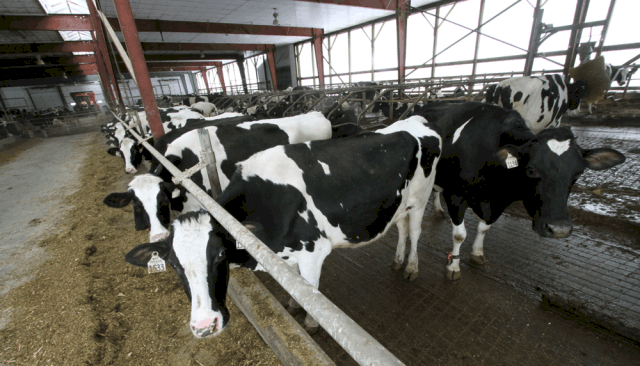
Dairy consumers will be able to rest easy knowing that their milk may be sourced from cleaner cattle.
Alison Vaughn is trying to potty train cows.
She believes toilet training cattle could greatly improve hygenic conditions within barns, benefitting both the consumers of dairy products and the cows themselves. As cow can produce up to 30 kilograms of excrement each day, trained cows could reduce the cost, time and labour associated with having to clean up their waste.
In training, Vaughn puts calves in stalls and gives them a diuretic to help them urinate. If the calves relieved themselves in the stall within an allotted time period, they were given a food reward. If they failed to urinate, the calves were sent into seclusion for five minutes as a punishment.
The results were compared to a control group of calves that were not given a diuretic. These calves were given the same punishment or reward based on whether or not they urinated in the stall.
Of the calves given the diuretic, five out of six urinated more in the stall than the control group who were not given the diuretic.
Although she is a PhD student from the Western College of Veterinary Medicine at the University of Saskatchewan, Vaughn does most of her research in B. C. She works at the University of British Columbia Dairy Education and Research Center in Agassiz.
The potty experiment is part of Vaughn’s PhD project titled “Practical Applications of the Learning Ability of Cattle.” Although previous research has been done on the learning ability of cattle, Vaughn says that her project is the first to examine whether or not cows can associate a specific place with using the bathroom.
“More and more people are starting to realize we can actually train cattle rather than treating them like inanimate blobs,” Vaughn said. “It enriches their lives and makes ours easier.”
Because dairy farming produces vast quantities of greenhouse gases, Vaughn’s research could also have environmental benefits.
“If we could better control the way we collect waste from cattle, we could maybe reduce emissions and things like nitrate leakage into water sources,” said Vaughn.
There are obstacles to overcome before toilet training cows becomes practical. Vaughn said that most cows may live in a number of barns throughout their lives. This raises the question of whether or not this would disrupt the potty training process or its success.
Despite these challenges, Vaughn is optimistic about the future of her research. She wants to eventually create an automated system to train cows rather than having to do it manually.
In the meantime, Vaughn is enjoying her project.
“One of the nicest things about doing my experiment is knowing that the cows really enjoy it. They run to the experimental pens.” said Vaughn.
—
Photo: GreenEnergyFutures/flickr
Leave a Reply